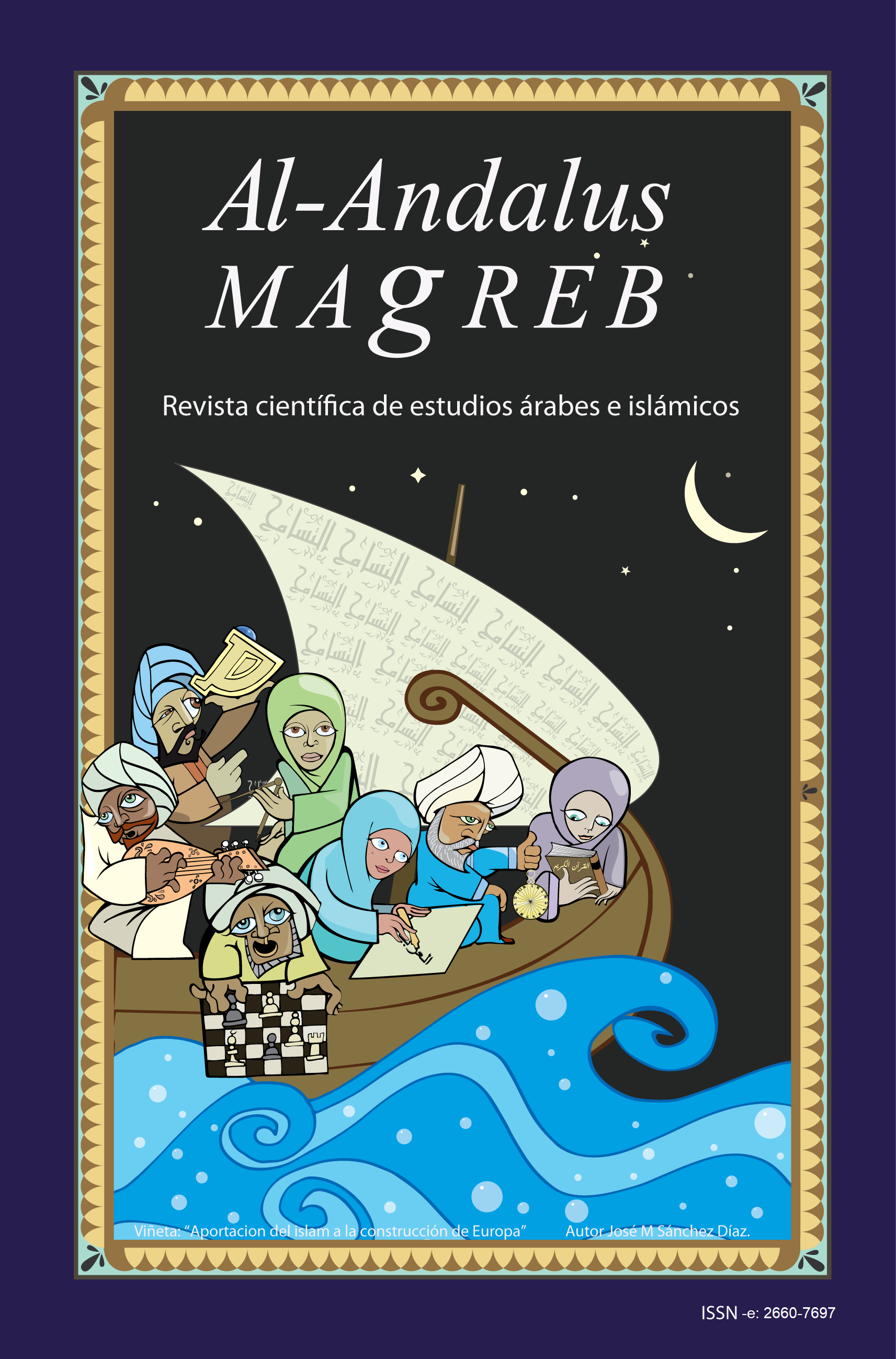Iraqi animal proverbs: metaphors referring to women.

Downloads
- PDF (Español (España)) 478
- EPUB (Español (España)) 77
- VISOR (Español (España))
- MOVIL (Español (España))
- XML (Español (España)) 59
DOI
https://doi.org/10.25267/AAM.2020.v27.06Info
Abstract
The proverb represents the experience of the people and a mirror that reflects their culture, and without any doubt, those who use the symbology of the animal occupy a large part of the collections of the proverbs. The objective of the present work is to highlight the image of women in Iraqi society in this category of the proverbs, thus identify the qualities of the animal that have been granted to women and show the sociocultural concepts they represent.
Keywords
Downloads
How to Cite
License

This work is licensed under a Creative Commons Attribution-NonCommercial-NoDerivatives 4.0 International License.
Those authors who have publications with this journal, accept the following terms:
a. Authors may retain their copyright and guarantee the journal the right of first publication of their work, which will be simultaneously subject to Licencia de reconocimiento de Creative Commons that allows third parties to share the work as long as its author is indicated. and its first publication this journal.
b. Authors may adopt other non-exclusive license agreements for the distribution of the version of the published work (eg: deposit it in an institutional electronic file) provided that the initial publication in this journal is indicated.
c. Authors are allowed and recommended to disseminate their work through the Internet (eg: in institutional telematic files or on their website) once the manuscript is accepted, which can lead to interesting exchanges and increase citations of the published work. (See El efecto del acceso abierto).
References
CAMPOS, Juana G. y BARELLA, Ana (1984): Diccionario de refranes. Madrid: Espasa- Calpe.
CANTERA ORTIZ DE URBINA, Jesús (2012): Refranero español. Madrid: Akal
CEJADOR Y FRAUCA, Julio (2008): Refranero castellano. Pamplona: Analecta.
CORREAS, Gonzalo (1992) Vocabulario de refranes y frases proverbiales y otras fórmulas comunes de la lengua castellana en que van todos los impresos antes y otra gran copia / que juntó [...] Gonzalo Correas: van añadidas las declaraciones y aplicación adonde pareció ser necesaria; al cabo se ponen las frases más llenas y copiosas; [prólogo de Miguel Mir; edición de Víctor Infantes]. Madrid: Visor
CORTÉS, Julio (1996). Diccionario de árabe culto moderno. Árabe- español. Madrid: Gredos.
BERGUA, José (1984): Refranero español: Colección de ocho mil refranes populares ordenados y explicados por José Bergua; Precedida del Libro de los Proverbios morales de Alonso Barros. Madrid: Clásicos Bergua.
ad-DABBĀĠ, ˁAbdul Jāliq Jalīl (1956): Maŷmaˁ ˀamṯāl al-Mawṣil al- ˁāmmiyya (Colección de refranes populares de Mosul) 2 vol. Mosul: al-Hadaf,
ad-DULAYŠĪ, ˁAbdul Latif (1966): Al-amṯāl aš-šaˁbiyya fi l-Baṣra (los refranes populares de Basora) vol.1. Bagdad: Editorial Šafiq.
— (1971): Al-amṯāl aš-šaˁbiyya fī l-Baṣra (los refranes populares de Basora) vol.2. Bagdad: Editorial Šafiq.
EL CORÁN (1984). Edición, traducción y notas de Julio Cortés. Madrid: Editora Nacional
ETXABE, Regino (1984): Diccionario de refranes comentados. Castellano: Ediciones de La Torre.
al-ḤANAFĪ, Ŷalāl (1962): Al-ˀamṯāl al-baġdādiyya (Los refranes bagdadíes) vol. I. Bagdad: Editorial Asˁad.
— (1964): Al-ˀamṯāl al-baġdādiyya (Los refranes bagdadíes) vol. 2. Bagdad: Editorial Asˁad.
ISCLA ROVIRA, Luis (1984): Spanish proverbs a survey of spanish cultura and civilization (in 2850 proverbs). Boston: University Press of America. MARTÍNEZ KLEISER, Luis (1989): Refranero general ideológico
español. Madrid: Hernando.
del MORAL, Celia (2002): «La fábula de animales en la literatura árabe
clásica». En A. Pérez Jiménez y G. Cruz Andreotti (eds.), “Y así dijo la zorra” la traducción fabulística en los pueblos mediterráneos (pp.185-207). Madrid. Ediciones Clásicas
NÚÑEZ, Hernán (2001): Refranes o proverbio en romance. Edición crítica por Louis Combet, Julia Sevilla Muñoz, Germán Conde Tarrío y Joseph Guia. Madrid: Guillermo Blázquez.
PIÑEL LÓPEZ, Rosa (1999): «El animal en el refrán, reflejo de una cultura. Estudio contrastivo alemán-español». Paremia, 8, 411-416.
RODRÍGUEZ MARÍN, Francisco (2007). Más de 21.000 refranes castellanos no contenidos en la copiosa colección del maestro Gonzalo Correas. Madrid: Revista de Archivos, Bibliotecas y Museos.
SAWICKI, Piotr, PABISIAK, Magdalena y SMIČEKOVÁ, Jitka (2001): «Cuando el asno puede... refranes castellanos sobre los animales y sus equivalentes semánticos en lenguas polaca y checa (1)». Eslavística Complutense, 1, 13- 37.
at-TIKRĪTĪ, ˁAbd ar-Raḥmān (1971): Ŷamharat al-ˀamṯāl al-baġdādiyya (Colección de los refranes bagdadíes) vol. 1. Bagdad: al-Iršad.
— (1978): Ŷamharat al-ˀamṯāl al-baġdādiyya (Colección de los refranes bagdadíes) vol. 2. Bagdad: aš-Šˁaab.
— (1981): Ŷamharat al-ˀamṯāl al-baġdādiyya (Colección de los refranes bagdadíes) vol. 3. Bagdad: Dār al-Ḥurriyya.
— (1986): Ŷamharat al-ˀamṯāl al-baġdādiyya (Colección de los refranes bagdadíes) vol. 4. Bagdad: Dār al- Ḥurriyya.
— (1986): Ŷamharat al-ˀamṯāl al-baġdādiyya (Colección de los refranes bagdadíes) vol. 5. Bagdad: Dār al-Ḥurriyya.
— (1991). Ŷamharat al-ˀamṯāl al-baġdādiyya (Colección de los refranes bagdadíes) vol. 6. Bagdad: Dār aš-Šuˀūn aṯ-Ṯaqāfīyya al-ˁĀmma.






